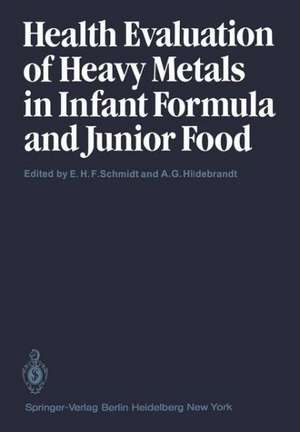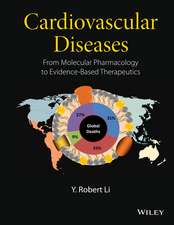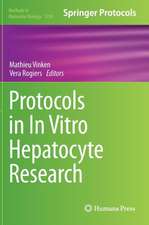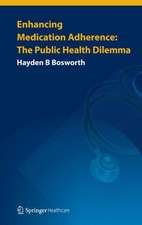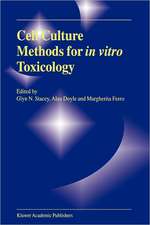Health Evaluation of Heavy Metals in Infant Formula and Junior Food
Contribuţii de J. Müller Editat de E. H. F. Schmidt, A. G. Hildebrandten Limba Engleză Paperback – 30 noi 1982
Preț: 712.81 lei
Preț vechi: 750.33 lei
-5% Nou
Puncte Express: 1069
Preț estimativ în valută:
136.44€ • 148.25$ • 114.68£
136.44€ • 148.25$ • 114.68£
Carte tipărită la comandă
Livrare economică 21 aprilie-05 mai
Preluare comenzi: 021 569.72.76
Specificații
ISBN-13: 9783540118237
ISBN-10: 3540118233
Pagini: 212
Ilustrații: XVI, 192 p. 9 illus.
Dimensiuni: 170 x 244 x 11 mm
Greutate: 0.35 kg
Ediția:Softcover reprint of the original 1st ed. 1983
Editura: Springer Berlin, Heidelberg
Colecția Springer
Locul publicării:Berlin, Heidelberg, Germany
ISBN-10: 3540118233
Pagini: 212
Ilustrații: XVI, 192 p. 9 illus.
Dimensiuni: 170 x 244 x 11 mm
Greutate: 0.35 kg
Ediția:Softcover reprint of the original 1st ed. 1983
Editura: Springer Berlin, Heidelberg
Colecția Springer
Locul publicării:Berlin, Heidelberg, Germany
Public țintă
ResearchDescriere
The ~uestion of whether an infant's diet represents a health hazard is not new. A health risk to infants from the intake of heavy metals via bottled food cannot be excluded at the present time. It is the purpose of this symposium to increase our knowledge of these disquie ting facts. If 70% of all environmental chemicals, including the ubi quituous heavy metals, enter the human body through food, to what extent are infants affected? Generally speaking, the effect on children has thus far been ex cluded from all the discussions concerning safety margins or limits on heavy-metal intake. Furthermore, this age group has also been largely excluded from studies determining the acceptable daily intake values for other substances. Paradoxically enough, such studies often contain a comment to the effect that children are particularly sensitive to these substances. The lack of consideration is certainly also due to the fact that little attention has been paid to this age group in toxicological research. The ZEBS study Heavy Metals in the Infant Diet by Kaferstein and MUller points to a mechanism which may increase the contamination of infant diet, namely the water used to prepare infant formula. Such facts as well as models for risk characterization have been presented by MUller and Schmidt in these proceedings. Yet many questions remain.
Cuprins
Heavy Metals in the Infant Diet.- Quantification in Food Regulatory Toxicology.- U.S. Food and Drug Administration Regulatory Strategies for Lead in Foods: Past, Present, and Future.- Impact of Infant Growth and Physiology on Heavy Metal Toxicity.- Impact of Dietary Components and Nutritional Status of Infants on the Toxicity of Heavy Metals.- The Importance of Trace Elements During the Years of Growth.- Essentiality and Toxicity of Heavy Metals.- The Toxicity of Heavy Metals in the Pregnant Woman, Fetus and Newborn Infant.- Absorption of Lead by Infants and Young Children.- Nutritional and Maturational Factors Modifying the Absorption of Inorganic Lead from the Gastrointestinal Tract.- On the Evidence for the Hypothesis of Lead Induced Disturbances of Neuropsychological Development.- The Absorption of Heavy Metals by the Growing Organism: Experimental Experience with Animals.- Metallothionein and Its Relationship to the Toxicity of Cadmium and Other Metals in the Young.- Recent Animal Studies with Regard to Cadmium Toxicity.- Toxicokinetics of Cadmium and Models for the Calculation of the Cadmium Load.- The Effects of Cadmium in the Human Organism.- The Toxicology of Mercury and Methyl Mercury.- The Toxicokinetics of Mercury.- Clinical Manifestations and Dose Dependency of Acute and Chronic Methylmercury Intoxication.- Special Contribution on Lead Contamination in Glasgow.- Summeries.- Summary of the Session “Presentation of the Problem”.- Summary of the Session “Characteristics of the Mineral Metabolism in Infants”.- Summary of the Session “Lead”.- Summary of the Session “Cadmium”.- Summary of the Session “Mercury”.- Final Discussions.
